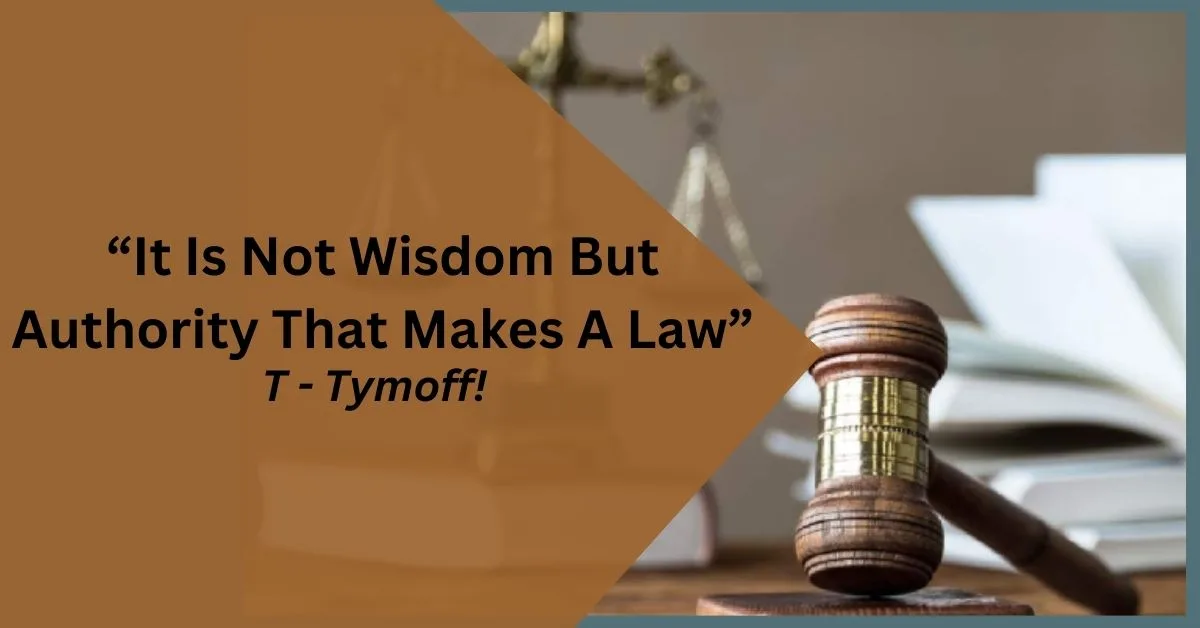Introduction:
Citing Tymoff, The Proverb “It Is Not Wisdom But Authority That Makes A Law” Emphasizes How Authority Prevails Over Knowledge In The Legislative Process And Casts Doubt On The Legitimacy Of Legislative Authority’s Long-Standing Foundation. This Guide Looks At This Statement’s Political, Intellectual, And Ethical Ramifications And Provides Insights Into How It Might Affect Social Norms And Government.
Context And Origin Of The Quote:
- Who Is Tymoff?: Provide Background Information On Tymoff, The Context In Which The Quote Was Made, And Any Relevant Biographical Details.
- Significance: Discuss Why This Quote Resonates In Discussions About Lawmaking And Authority.
Understanding The Quote:
- Definition Of Wisdom And Authority: Define Wisdom As Knowledge And Sound Judgment, And Authority As The Power To Enforce Rules And Decisions.
- Interpretation: Explore The Quote’s Interpretation That Authority, Rather Than Wisdom, Dictates The Creation And Enforcement Of Laws.
Philosophical And Political Implications:
- Legitimacy Of Laws: Analyze How Authority Contributes To The Legitimacy Of Laws, Regardless Of Their Inherent Wisdom Or Fairness.
- Power Dynamics: Discuss The Balance Between Governmental Authority And Public Trust In Lawmaking Processes.
Ethical Considerations:
- Ethics Of Lawmaking: Consider The Ethical Implications Of Laws Created Without Wisdom, Focusing On Fairness, Justice, And Societal Impact.
- Public Perception: Explore How Perceptions Of Authority Influence Public Acceptance And Compliance With Laws.
Historical And Contemporary Examples:
- Historical Context: Provide Examples From History Where Laws Were Established Based On Authority Rather Than Wisdom, With Consequences For Society.
- Current Relevance: Discuss Contemporary Issues Where The Quote’s Sentiment Applies, Such As Controversial Laws Or Policies.
Wisdom Vs. Authority In Governance:
- Role Of Wisdom: Examine The Role Of Wisdom In Lawmaking, Including The Importance Of Informed Decision-Making And Public Policy Expertise.
- Challenges To Authority: Consider Movements Or Instances Where Challenges To Authority Have Led To Legal Reform Or Societal Change.
Thought Leaders’ Quotes And Thoughts:
- Additional Perspectives: Include Quotes Or Insights From Other Philosophers, Legal Scholars, Or Political Figures On The Relationship Between Wisdom, Authority, And Law.
Conclusion:
Tymoff’s Statement, “It Is Not Wisdom But Authority That Makes A Law,” Makes One Stop And Consider Where Legislative Power Comes From And How It Affects Social Structure And Government. It Challenges Individuals To Consider The Balance Between Wisdom, Authority, And Ethical Responsibility In Lawmaking Processes.
Final Thoughts:
While Authority Plays A Significant Role In Lawmaking, The Quote Encourages A Critical Examination Of The Ethical Foundations And Societal Impacts Of Laws Created Without Wisdom. By Understanding The Complexities Of This Statement, Individuals Can Contribute To Discussions On Improving Legal Systems And Promoting Justice In Society. This Guide Provides A Detailed Exploration Of The Quote “It Is Not Wisdom But Authority That Makes A Law. T – Tymoff,” Offering Philosophical Insights And Ethical Considerations On The Dynamics Of Lawmaking. Please Let Me Know If There Are Any Particular Areas You Would Want To See More Of Or If You Have Any Other Suggestions.

